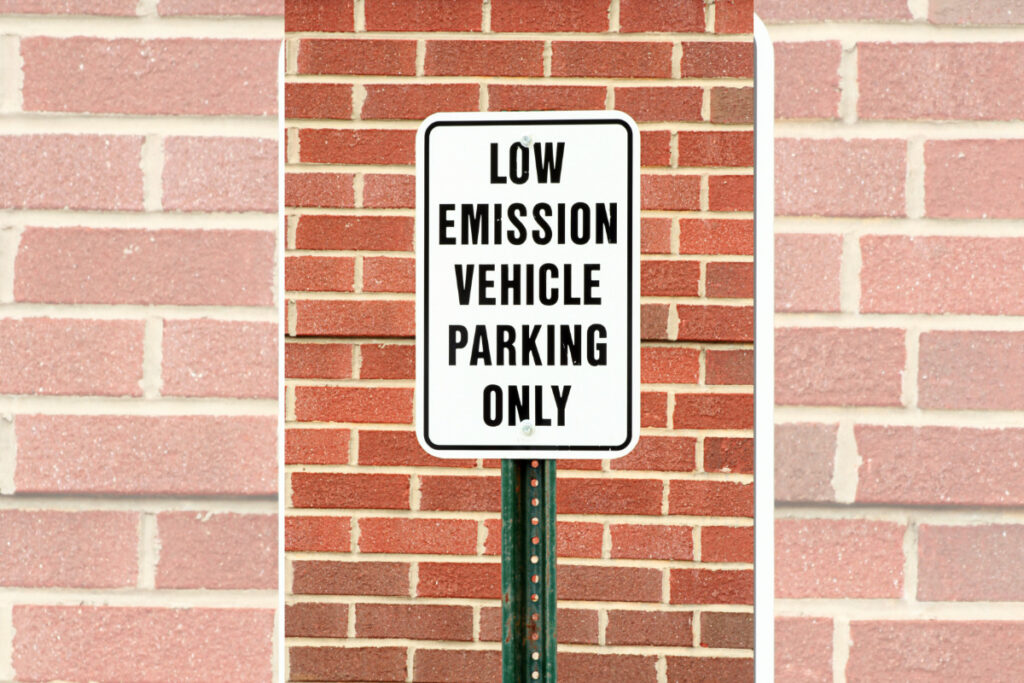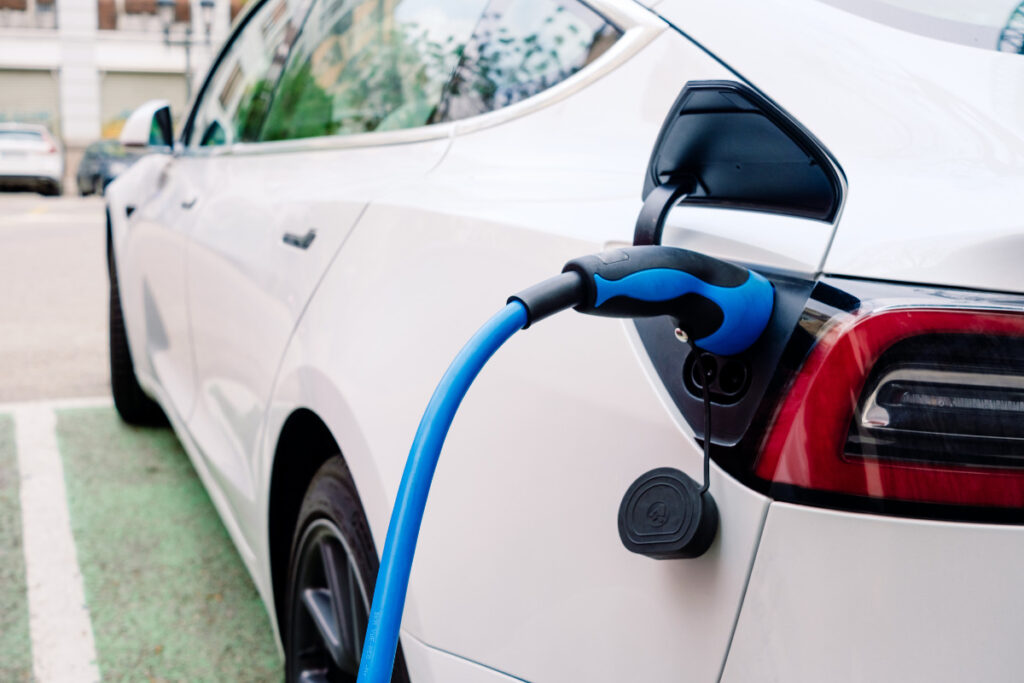Introduction
The age-old debate between electric vehicles and gas cars continues, especially regarding their environmental impact. As we strive for a more sustainable future, understanding the difference between these two vehicle types is crucial in making informed choices for our planet’s well-being.
This blog post will dive deep into the carbon footprint and environmental implications of electric vehicles vs. gas cars. We will debunk common myths surrounding electric vehicles and explore how they can contribute toward a greener tomorrow. Join us as we unravel the true story behind your wheels!
Comparing The Environmental Impact Of Electric Vehicles Vs
Electric vehicles have a lower environmental impact than gas cars. Considering carbon emissions during manufacturing and driving and their effects on air quality, water, and soil.
Carbon Emissions During Manufacturing
The environmental impact of EVs versus gas cars hinges on carbon emissions during manufacturing. Both vehicle types generate carbon emissions during production. However, manufacturing electric car batteries is often more energy-intensive and produces more greenhouse gases than traditional ICE vehicles. This is primarily due to the mining and processing of raw materials like lithium, cobalt, and nickel required for EV batteries. Considering this aspect while evaluating the environmental impact of EVs versus gas cars is crucial.
Although EV battery production initially causes high carbon emissions, studies reveal that EVs offset this through their operational phase. EVs generate zero tailpipe emissions while driving and rely on cleaner energy sources like renewables, reducing their negative climate impact. They emit 50% less carbon than ICEs when charged with clean energy, despite initially emitting more greenhouse gases. EVs lead to a greener driving experience with reduced reliance on fossil fuels, resulting in lower pollution levels.
Emissions During Driving
EVs significantly reduce emissions during driving by producing zero tailpipe emissions due to their use of clean energy. This eliminates releasing harmful greenhouse gases like carbon dioxide, nitrogen oxide, and particulate matter. These pollutants contribute to climate change and poor air quality, negatively impacting human health. In contrast, gasoline-fueled vehicles emit substantial amounts of these same pollutants throughout their lifetime.
Furthermore, hybrid vehicles – those that combine an internal combustion engine with electric power – result in lower emissions compared to traditional gas cars while still offering extended driving range capabilities. Although not entirely zero-emission like all-electric models, hybrids provide a more environmentally friendly option for drivers concerned about reducing their carbon footprint.
EVs’ total greenhouse gas emissions reduce further with renewable energy sources like solar or wind power. However, the eco-friendliness of EVs also depends on the electricity used to charge them. Some regions still rely on fossil fuel-based electricity generation, resulting in higher indirect pollution from charging EVs. Sustainable transportation solutions like renewable energy charging infrastructures can lead to cleaner and greener driving experiences for everyone involved.
Impact On Air Quality
The impact of electric vehicles (EVs) on air quality represents a significant advantage over gas-powered cars. Traditional internal combustion engines emit pollutants such as nitrogen oxides, sulfur dioxide, volatile organic compounds, and particulate matter. These emissions contribute to greenhouse gas emissions and severely affect public health, leading to respiratory illnesses and cardiovascular diseases.
Electric vehicles produce zero tailpipe emissions, which helps improve overall air quality in urban areas where pollution from transportation is an ongoing concern. For example, cities like Los Angeles and Beijing have witnessed significant improvements in their air quality due to the growing adoption of EVs and sustainable transportation solutions. This reduction in harmful emissions allows citizens to breathe cleaner air with reduced risks associated with respiratory problems.
EVs indirectly promote better air quality by using renewable energy sources like solar or wind power, reducing greenhouse gas emissions. The transition to EVs positively impacts the environment and promotes healthier living conditions for all members of society.
Impact On Water And Soil
Another significant impact of gas cars on the environment is their effect on water and soil. Gasoline contains harmful chemicals that can contaminate groundwater and soil when leaks occur, leading to environmental damage. In contrast, electric vehicles do not have these toxic emissions since they run on electricity stored in batteries rather than burning fuel.
Overall, while there are concerns about the potential environmental impacts of electric vehicle manufacturing processes, it is clear that their use has a significantly lower impact on water and soil compared to gas-powered cars. Additionally, mining for materials like lithium and cobalt used in electric vehicle batteries can also cause pollution of water sources if not done responsibly. However, many manufacturers are working to ensure responsible sourcing practices to reduce this impact.
Disposal Of Batteries
Disposing of electric car batteries is a critical issue in the debate over their environmental impact. While batteries can last several years, they will eventually need to be replaced and disposed of properly. Battery recycling programs are being developed to mitigate the negative impact on the environment. These programs can recover valuable materials such as lithium and cobalt, which can be used in new battery production or other applications.
Improper disposal of batteries, however, can release toxic chemicals into soil and groundwater, leading to severe environmental damage. Experts recommend that electric car owners dispose of old batteries through certified recyclers instead of throwing them away with household trash.
Fortunately, advancements in battery technology are continually being made to improve performance and sustainability. Electric vehicle manufacturers are exploring ways to make renewable energy sources such as solar or wind power available for charging stations, reducing reliance on fossil fuels for transportation.

Debunking Myths And Misconceptions About Electric Vehicles
Electric Cars are Not Green; Battery Production is Not Environmentally Friendly; Electric Cars are More Expensive; and Charging an Electric Car is Inconvenient – all of these common misconceptions about electric vehicles will be debunked in this section.
Electric Cars Are Not Green
One of the biggest misconceptions about electric cars is that they aren’t environmentally friendly. Critics argue that while electric vehicles may produce fewer emissions during driving than gas cars, their production and disposal have a significant environmental impact. However, experts broadly agree that electric vehicles create a lower carbon footprint than cars and trucks using gasoline. In fact, most electric cars produce significantly fewer planet-warming emissions than gas-powered vehicles over their lifetime.
It’s worth noting that while the manufacturing process for some electric car batteries can be carbon-intensive, this impact is offset by the lower emissions produced during driving. Additionally, technological advancements are helping to make battery production cleaner and more sustainable over time.
Overall, it’s clear that electric cars have a much smaller environmental impact compared to traditional gas-powered vehicles. While there are still factors to consider, such as energy consumption during charging and proper disposal of batteries at end-of-life, choosing an all-electric or hybrid car can help reduce your carbon footprint and promote sustainable transportation.
Battery Production Is Not Environmentally Friendly
The production of batteries for electric cars has improved drastically over recent years, with many automakers shifting towards more sustainable practices and materials. A common misconception is that producing electric vehicle batteries is not environmentally friendly. While it’s true that battery manufacturing impacts the environment, it’s important to consider the bigger picture.
Additionally, most companies are working towards improving battery recycling efforts to minimize waste and pollution. For example, Tesla has been using recycled materials in its car batteries since 2018, significantly reducing their environmental impact. While initial environmental costs may be associated with producing these batteries, they are much less harmful than traditional gas-car emissions.
As we strive towards creating a more sustainable future, we must focus on all aspects of transportation – including what goes into making our vehicles run efficiently. Electric vehicle manufacturers have made significant strides in creating greener processes for building their cars and batteries while prioritizing consumer performance and affordability.
Electric Cars Are More Expensive
One of the most common myths about electric vehicles is that they are more expensive than gas cars. While it’s true that electric vehicles generally have a higher upfront cost, this is offset by lower fuel and maintenance costs over time. According to Consumer Reports, “electric-car drivers can save over $10,000 on car ownership costs compared with gas cars over five years.”
Furthermore, prices are starting to decrease as demand for electric cars grows. In fact, there are now several all-electric models available for under $30,000 after federal tax credits. So while it may be true that electric vehicles are initially more expensive than gas cars, the long-term savings make them a wise investment for budget-conscious consumers.
When comparing the environmental impact of electric vehicles vs. gas cars, it’s clear that electric vehicles come out ahead. While they may be slightly more expensive upfront, the long-term benefits of lower emissions and reduced operating costs make them an attractive alternative to traditional combustion engine vehicles.
Charging An Electric Car Is Inconvenient
One common misconception about electric vehicles is that charging them is inconvenient. However, this is not true with the increasing availability of public charging stations and the option to install a home charging station. In fact, many electric car owners find charging their vehicle at home overnight more convenient than making frequent trips to gas stations.
Furthermore, advancements in fast-charging technology have made it possible to charge an electric car up to 80% in as little as 30 minutes at certain public charging stations. This means that even on long road trips, drivers can quickly recharge their car while taking a rest stop or getting something to eat.
Overall, while some limitations and challenges are still associated with owning an electric vehicle, inconvenient charging should not be one of them. As technology improves and infrastructure expands, more options for easy and convenient EV charging will be available.

Advantages Of Electric Vehicles Over Gas Cars
Electric vehicles have numerous advantages over gas cars, including zero emissions while driving, lower fuel and maintenance costs, and a smoother and quieter driving experience. Discover how switching to electric vehicles can benefit you and the environment.
Zero Emissions While Driving
One of the biggest advantages of electric vehicles over gas cars is their ability to produce zero emissions while driving. Unlike traditional gasoline-powered vehicles, which release harmful pollutants into the air as they run, electric cars emit no tailpipe pollutants. This means an electric vehicle releases no greenhouse gases or particulate matter into the environment during operation.
While it’s true that some electricity sources used for charging EVs still contribute to greenhouse gas emissions upstream in the energy supply chain (such as coal-fired power plants), studies have shown that even under these scenarios, EVs still produce fewer total emissions than those comparable to conventional vehicles. So overall, from well-to-wheel, electric cars are greener transportation options on average when you consider fuel production and use, vehicle manufacturing, and disposal.
Zero-emissions driving also translates into a better experience for drivers and passengers alike: since there is no internal combustion engine generating noise or vibration within an electric car’s cabin, rides are smoother and quieter; this can make them more comfortable on long drives or during daily commutes through busy city streets. With all things considered, choosing an EV with zero tailpipe emissions can be good news for both your wallet at the pump and the health of our planet too!
Lower Fuel Costs
Electric vehicles have a clear advantage over gas cars regarding fuel costs. While traditional cars require constant refueling with gasoline or diesel, electric vehicles draw their power from electricity much cheaper than fossil fuels. According to the Department of Energy, an EV driver can save about $1,000 in fuel costs per year compared to a gas-powered car.
Moreover, electricity costs remain more stable and predictable than gasoline prices, which fluctuate wildly depending on geopolitical events and market forces. With renewable energy sources becoming increasingly available and affordable, EV owners can look forward to even lower charging costs in the future. For example, Tesla owners who use their Supercharger stations are charged based on local electricity rates that vary between regions but still come out significantly less expensive than filling up at the pump.
In addition to saving money at the pump itself, owning an electric vehicle allows for significant savings in maintenance costs since they have fewer moving parts requiring repair or replacement as compared to traditional gas-powered cars. Overall then, transitioning towards electric vehicles benefits not only our planet but also our wallets!
Lower Maintenance Costs
One of the advantages of electric vehicles over gas cars is the lower maintenance costs. Electric cars have fewer moving parts than gas cars, reducing the need for frequent repairs and replacements. For example, there’s no engine oil to change, no spark plugs to replace, and no belts or hoses to break down. Additionally, regenerative braking in electric cars keeps brake pads from wearing out as often as in traditional vehicles.
A Consumer Reports study found that EV drivers spend 50% less on maintenance and repair than gas car drivers in the first five years of ownership. Electric cars are more eco-friendly and cost-effective over time.
Moreover, many automakers offer warranties on their electric car batteries for up to eight years or 100K miles, which adds an additional incentive for buyers worried about battery replacement costs down the road. Overall lower maintenance and repair expenses make owning an electric vehicle more financially sustainable while operating at optimal performance levels throughout its lifetime.
Smoother And Quieter Driving Experience
Electric vehicles offer a smoother and quieter driving experience compared to gas-powered cars. Electric vehicles have fewer moving parts, meaning less noise, vibrations, and harshness inside the cabin. The torque provided by electric motors is available instantly, providing quick acceleration that feels smooth and seamless. Additionally, electric drivers can enjoy a peaceful ride without distractions since there is no engine noise or vibration.
Making The Switch To Electric Vehicles
Selecting the right electric car that suits your needs, installing a charging station at home, and utilizing renewable energy resources are key steps to consider when switching to electric vehicles.
Choosing The Right Electric Car For Your Needs
If you’re considering switching to an electric vehicle, remember a few things when choosing the right one for your needs. Here are some factors to consider:
- Range: Look for an electric car with a range that will suit your daily commute or driving needs. Most EVs range around 100-300 miles on a single charge.
- Battery size: A bigger battery means more range and higher cost. Consider your budget and the range you need before choosing the battery size.
- Charging speed: Different EVs have varying charging times. Consider how fast you need your car to charge when on the go.
- Cost: Electric vehicles may be more expensive upfront than gas cars. But they can save money in the long run with lower fuel and maintenance costs.
- Model options: Many electric car models are available now, from compact hatchbacks to SUVs and luxury sedans. You can choose one that fits your lifestyle and needs.
- Safety features: Check the safety ratings and available safety features of any electric car you’re considering.
- Environmental impact: Research the production process and materials used in the EV you’re considering and its overall lifetime carbon footprint.
Considering these factors, you can find the electric car that best fits your needs while reducing your environmental impact and saving money on fuel costs.

Installing Home Charging Stations
Installing a home charging station is crucial for electric vehicle owners as it allows for convenient and efficient charging. Here are some steps to consider when installing a home charging station:
- Determine the type of charger needed based on the electric car model and power source availability.
- Hire a licensed electrician to install the charging station and ensure proper wiring and circuit breaker size.
- Choose a suitable location to install the charging station, such as a garage or outdoor space with protection from the elements.
- Check for any local building codes or permits required for installation.
- Consider using renewable energy sources. Such as solar panels or wind turbines, to power the charging station for even greater environmental benefits.
It’s important to note that while the initial cost of installing a home charging station may be high, it can save money in the long run compared to using public charging stations or gasoline for fuel. Additionally, renewable energy sources can further reduce carbon emissions associated with electric vehicle use.
Using Renewable Energy To Charge Your Car
Using renewable energy sources to charge your electric car is essential to switch to sustainable transportation. Renewable energy sources like solar or wind power can significantly reduce the carbon footprint of charging an electric vehicle. In fact, depending on the source of electricity used for charging, an all-electric vehicle’s emissions can be up to 60% lower than those of a gas-powered car.
Generate solar power to charge your EV and save money while reducing emissions. Many utility companies offer green energy programs. Installing solar panels at home is a great way to ensure your electric vehicle is powered by renewable energy.
Clean energy powers EVs, reduces emissions and promotes sustainable transportation options. Consider the type of vehicle and fuel for a greener future.
Conclusion: The Environmental Benefits Of Electric Vehicles Over Gas Cars
In conclusion, the evidence overwhelmingly supports the environmental benefits of electric vehicles over gas cars. While both negatively impact our planet, electric vehicles produce significantly fewer emissions and have a lower carbon footprint over their lifetime.
Debunking myths and misconceptions about these eco-friendly rides is crucial in encouraging more people to switch. With advancements in battery technology, installing charging stations at home or work has never been easier.
Choosing renewable energy sources to power your vehicle only adds to its sustainability credentials. By switching to electric vehicles, we can all do our part in combating climate change and creating a more sustainable future for future generations.

FAQs:
- Are electric vehicles really better for the environment than gas cars?
Electric vehicles have a significantly lower environmental impact than gas cars. They produce zero emissions from their tailpipes and require less energy. However, the overall environmental impact depends on factors such as where the electricity used to charge them comes from.
- How much CO2 is emitted by electric vehicles than gas cars?
Electric vehicles emit far less CO2 throughout their lifecycle when compared to a traditional gasoline-powered car due to their lack of combustion engines and reliance on resources with low carbon outputs for power generation.
- What are some other environmental benefits of electric vehicles?
In addition to producing fewer emissions, using an EV reduces noise pollution, preserves natural resources utilized in conventional fuel production, and can help reduce dependence on foreign oil imports.
- Are there any downsides to driving an electric vehicle over a gas car regarding environmental impact?
EVs have minimal downsides but come with additional costs in manufacturing and disposal. Proper recycling initiatives are essential to minimize adverse effects.
